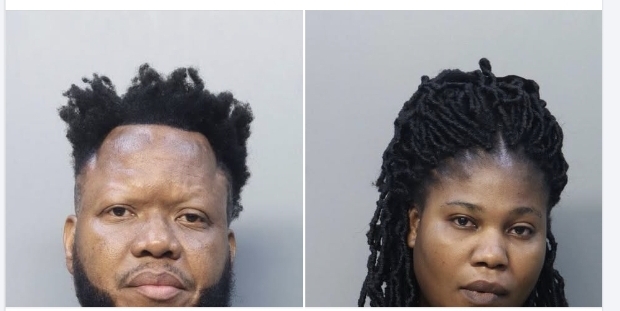
In a quiet Miami-Dade County neighborhood, a 10-year-old girl endured unimaginable pain when her stepfather, Georgy Almony, 42, allegedly punished her for a minor sibling squabble by pressing her hand onto a scorching stovetop. The burn was so severe that it seared the shape of the stove’s coil into her skin, leaving a permanent mark of the horrific act. The incident, which took place on April 12, 2025, in Biscayne Gardens, came to light only when the girl’s schoolteacher noticed the injury and alerted authorities, exposing a disturbing case of child abuse and neglect that has shocked the community.
The girl, whose name has been withheld to protect her privacy, had reportedly pushed her younger brother, prompting Almony’s violent reaction. According to police reports, he grabbed her arm, dragged her to the kitchen, and deliberately held her hand against the hot stove. The child’s screams echoed through the home as she fled to her room, clutching Almony’s phone to call her mother, Milliene Adeclat, 36, who was at work. Desperate for help, the girl recounted the incident, but Adeclat, her own mother, allegedly failed to act. She neither sought medical attention for her daughter’s severe burn nor reported the abuse to authorities, leaving the child to suffer in silence.
It wasn’t until Monday, April 14, 2025, that the girl’s teacher, alarmed by the visible burn mark and the child’s distress, contacted the Miami-Dade Sheriff’s Office. Deputies responded swiftly, launching an investigation that led to the arrests of both Almony and Adeclat. Almony faces charges of aggravated child abuse causing great bodily harm, a felony reflecting the severity of the girl’s injuries. Adeclat, charged with child neglect causing great bodily harm, also faces additional counts of aggravated battery on a law enforcement officer and resisting arrest with violence after she reportedly pushed and swung at officers attempting to take her into custody.
The case has drawn significant attention in Miami-Dade, where community members and child welfare advocates are calling for stronger protections for vulnerable children. The girl’s injuries, described as causing skin to peel away and leaving a coil-shaped scar, underscore the physical and emotional toll of the abuse. Authorities have not released details about the girl’s current condition or whether she has been placed in protective custody, but the incident has raised questions about how such abuse went unnoticed in the household.
Investigators noted that the family lived in an unincorporated area of Biscayne Gardens, a working-class community north of Miami. The delay in reporting the abuse—two days after the incident—has fueled criticism of the mother’s inaction and highlighted the critical role of educators in identifying signs of abuse. Teachers, often the first to notice changes in a child’s behavior or physical condition, serve as a vital line of defense for children in abusive environments.
Almony and Adeclat were taken into custody and are being held at the Turner Guilford Knight Correctional Center. During questioning, Adeclat denied the allegations, but police accounts and the physical evidence of the girl’s injury paint a damning picture. The case is now proceeding through the legal system, with both adults facing significant prison time if convicted. Prosecutors are expected to argue that Almony’s actions constitute intentional harm, while Adeclat’s failure to intervene or seek help for her daughter represents a profound betrayal of parental responsibility.
This tragic incident serves as a stark reminder of the hidden dangers some children face within their own homes. It has sparked renewed discussions about the need for community vigilance, improved reporting mechanisms, and support systems to protect children from abuse. As the legal process unfolds, the focus remains on ensuring justice for the young victim and preventing similar tragedies in the future. The Miami-Dade Sheriff’s Office has encouraged anyone with information about suspected child abuse to come forward, emphasizing that early intervention can save lives.